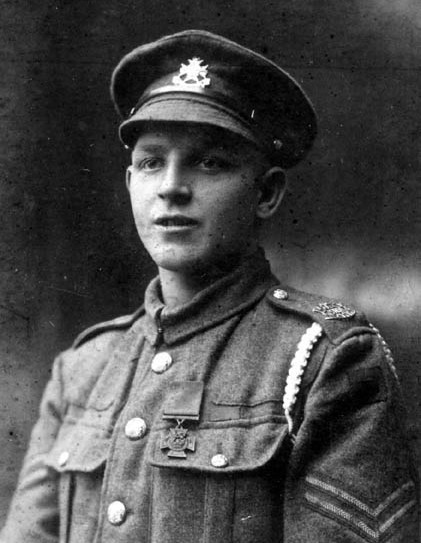Stoke-on-Trent seeks relatives of WWI heroes
- Home
- Latest News
- 2025
- August 2025
- Stoke-on-Trent seeks relatives of WWI heroes
Stoke-on-Trent City Council has launched an appeal to trace living relatives of two Victoria Cross recipients from the First World War, aiming to invite them to special commemorative events scheduled for November. The search focuses on Lance-Sergeant John Harold Rhodes and Corporal Ernest Albert Egerton, both local men who earned Britain's highest military honor during the brutal campaigns of 1917. This initiative represents a continuation of the city's commitment to honoring its war heroes, following a successful previous search for relatives of the city's third Victoria Cross recipient from World War II. The appeal forms part of Stoke-on-Trent's centenary celebrations.
Lance-Sergeant John Harold Rhodes represents one of the most decorated non-commissioned officers in Grenadier Guards history. Born on Mellor Street in Packmoor in 1891, Rhodes came from military stock—his father Ernest had served in both the Zulu War and First Boer War. Before the war, John worked as a miner at Chatterley-Whitfield Colliery, enlisting in the Grenadier Guards in February 1911.
Rhodes served an initial three-year term before returning to civilian life, only to be recalled as a reservist when war broke out. He deployed to France on August 13, 1914, participating in the retreat from Mons and subsequent battles at Landrecies, Villers Cotterets, and the Aisne. His service was marked by extraordinary close calls—a comrade was shot through the heart while standing directly in front of him, shell fragments missed his head by mere inches, and he was partially buried during a Christmas Eve barrage in 1914.
Corporal Ernest Albert Egerton followed a different path to heroism. Born in 1897 on Meir Lane in Caverswall, Longton, he was just 20 when he earned his Victoria Cross. After his mother's death when he was three, his father Thomas Henry Egerton, a potter's engine fitter, remarried. Ernest worked as a haulage hand for the Florence Coal and Iron Company before enlisting in the 3rd North Staffordshire Regiment in November 1915.

Rhodes accumulated his honors progressively through acts of exceptional courage. He earned his Distinguished Conduct Medal on May 18, 1915, for conducting a dangerous patrol that brought back valuable intelligence and twice volunteering to rescue wounded soldiers under heavy fire. A bar to the DCM followed on August 6, 1915, recognizing his "great coolness and bravery" in digging out wounded men after a mine explosion, continuing his efforts until both he and his companion were wounded.
His Victoria Cross action came on October 9, 1917, at Houthulst Forest during the Third Battle of Ypres. Rhodes single-handedly stormed an enemy pillbox through both his own artillery barrage and hostile machine-gun fire, capturing nine prisoners including a forward observation officer with a telephone connection to the enemy battery position.

Egerton's moment came during the same campaign but earlier, on September 20, 1917, southeast of Ypres. The official citation describes how visibility was severely reduced by fog and smoke, allowing enemy positions to remain active after the initial attack waves passed over them. When called for volunteers to address the situation, Egerton "dashed for the dugouts under heavy fire at short range," shooting a rifleman, bomber, and gunner before support arrived and 29 enemy soldiers surrendered.
Personal sacrifices and recognition
Both men's stories reflect the personal costs of heroism. Rhodes married Elizabeth Meir on December 11, 1915, and had a son John born on May 13, 1917—a child he would never meet. He was mortally wounded on November 27, 1917, at Fontaine Notre Dame, France, dying before his commanding officer could inform him that he had been awarded the Victoria Cross.
Egerton survived to receive his decoration personally from King George V at Buckingham Palace on December 5, 1917. His homecoming to Stoke-on-Trent three days later was triumphant—met by the mayor, treated to lunch at the North Stafford Hotel, and carried shoulder-high through cheering crowds in Longton. However, he was gassed on March 21, 1918, and though promoted to sergeant, he was discharged in April 1919 with a 100% disability assessment due to tuberculosis.
Legacy and commemoration
The current appeal, championed by Lord Mayor Councillor Steve Watkins—himself a veteran—aims to locate relatives for November commemorative events that will include an expanded exhibition at The Potteries Museum & Art Gallery and an Act of Remembrance at Festival Park. "As a veteran, it's incredibly important to me that we honour the legacy of the city's war heroes," Watkins stated. "These men showed extraordinary courage in the face of some of worst conflicts in history."
Anyone with information about potential relatives of either Victoria Cross recipient is encouraged to contact the council at sot100@stoke.gov.uk.





